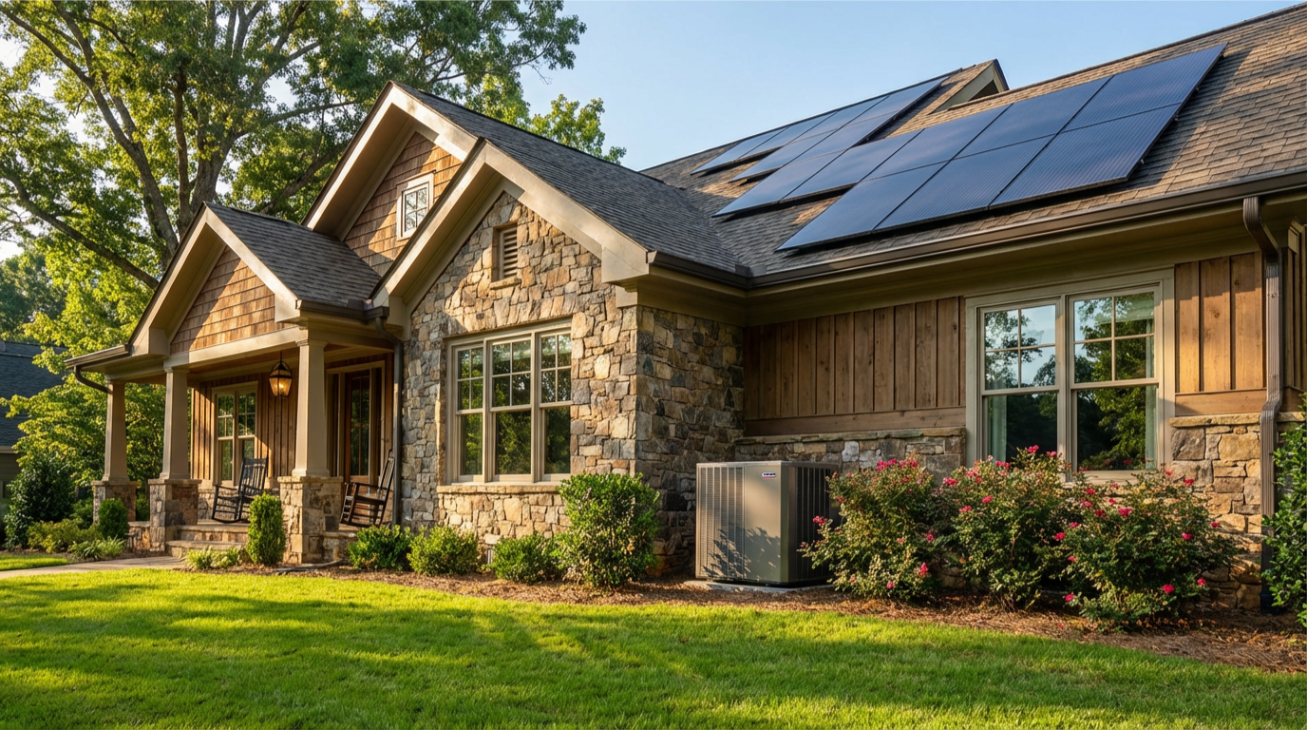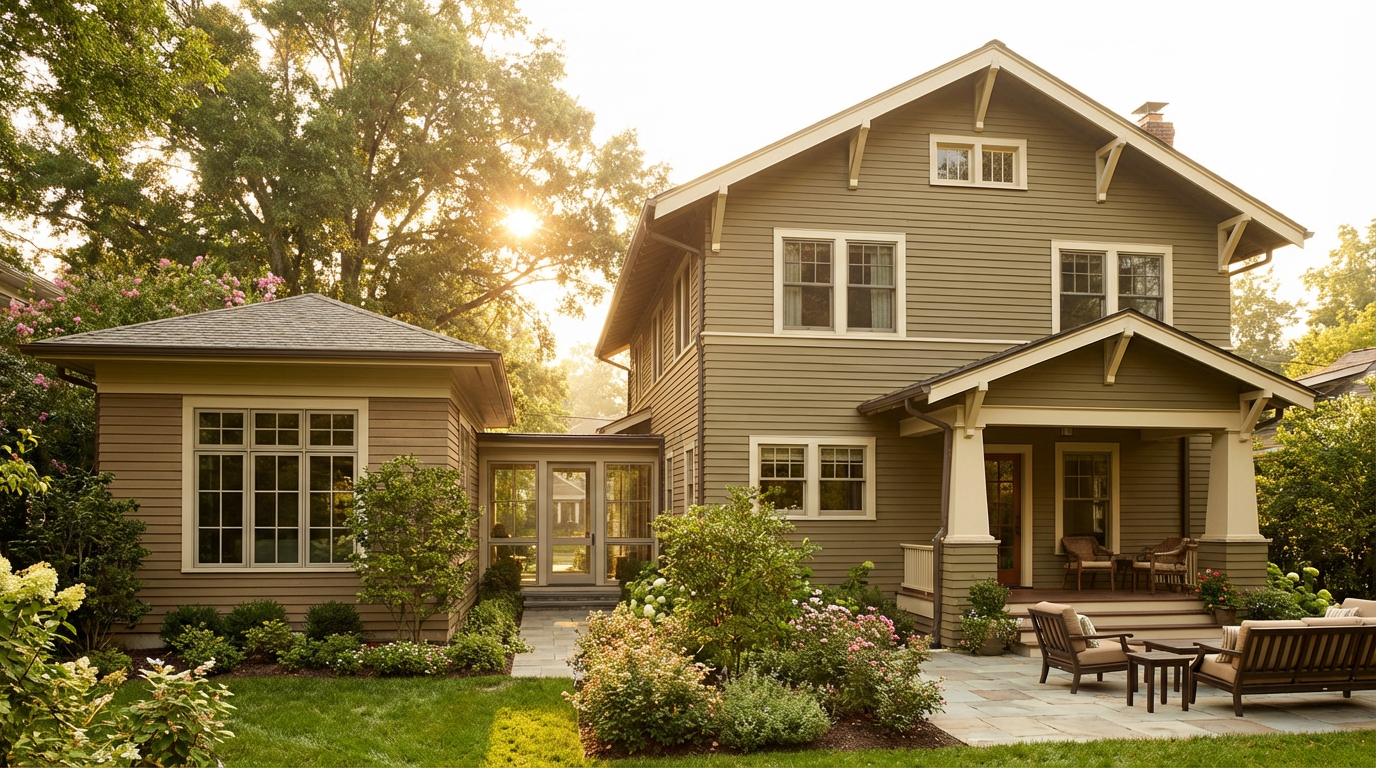Your basement financing decision determines whether your project succeeds or becomes a financial nightmare. Over my 22 years as a licensed contractor in Georgia, I’ve seen homeowners make costly mistakes: taking 18% personal loans when they qualified for 7% HELOCs, or choosing fixed loans that couldn’t handle surprise moisture remediation costs in our notorious clay soil.
Georgia homeowners face unique basement remodeling financing challenges, expansive clay creates moisture issues, humid summers require specialized HVAC, and permit costs vary dramatically between Cherokee County ($150+) and North Fulton ($200+). With basement loan options in Georgia ranging from Georgia’s Own Credit Union’s 4.75% APR introductory HELOCs to same-day contractor financing approvals, your choice affects both monthly budgets and project outcomes.
This guide provides battle-tested advice from financing hundreds of Georgia basement renovation loans. You’ll learn which lenders offer the best rates, how to avoid common pitfalls, and why the wrong financing choice can add $10,000+ to your project cost.
Basement Financing Options Georgia: Quick Comparison
| Financing Type | Best For Basements | Typical GA Rates (Summer 2025) | Approval Time |
| HELOC | Phased construction, cost uncertainties | 4.75% – 8.50% APR | 30-45 days |
| Home Equity Loan | Fixed quotes, predictable payments | 6.75% – 8.25% APR | 30-45 days |
| Cash-Out Refinance | Large projects ($80K+), rate improvement | Current mortgage rates | 45-60 days |
| Personal Loan | Under $50K, limited equity | 7.99% – 24.99% APR | 3-7 days |
| Contractor Financing | Immediate approval, flexible credit | 9.99% – 24.99% APR | Same day |
Rates shown reflect typical ranges for qualified borrowers. Actual rates depend on creditworthiness, loan-to-value ratio, and lender requirements.
The best basement financing in Georgia is typically a HELOC from local credit unions, with rates starting at 4.75% APR from Georgia’s Own Credit Union.
For a local pricing breakdown, see our basement remodel costs guide for Woodstock, GA.
How Much Does Basement Financing Cost in Georgia?
Quick Answer: Georgia basement projects cost $32,000-$180,000. Most homeowners finance $40,000-$80,000 for mid-range renovations including bathroom additions and moisture control systems.
Basement Project Costs by Size and Scope
Basic Basement Finishing (600-800 sq ft):
- Cost Range: $24,000 – $52,000
- Monthly Payment Example: $347-$750 (HELOC at 7.25% APR, 10-year term)
- Includes: Framing, drywall, LVP flooring, basic electrical
Mid-Range Basement Renovation:
- Cost Range: $52,000 – $76,000
- Monthly Payment Example: $750-$1,100 (HELOC at 7.25% APR)
- Includes: Bathroom addition, moisture control, HVAC extension
Luxury Basement Transformation:
- Cost Range: $76,000 – $120,000+
- Monthly Payment Example: $1,100-$1,730 (HELOC at 7.25% APR)
- Includes: Full bathroom, wet bar, smart home integration
Georgia-Specific Basement Costs to Finance
Moisture Control Systems: $3,000-$8,000 (Essential in Georgia’s clay soil)
HVAC Extensions: $3,000-$8,000 (Required for humidity control)
Permits: $150-$500 (Varies by Cherokee County vs. North Fulton)
For a detailed breakdown of these costs, see our comprehensive guide on basement finishing costs in Atlanta or check out the most expensive parts of a basement remodel!
HELOC Basement Financing Georgia: Best Rates & Benefits
HELOCs dominate Georgia basement remodeling financing. In my experience completing over 300 basement finishing projects across North Atlanta, basement renovations involve more unknowns than any other home improvement. I’ve seen moisture issues add $8,000 to Cherokee County projects and HVAC upgrades surprise Alpharetta homeowners with $6,000 in additional costs. HELOCs provide the flexibility that fixed basement home equity loans simply can’t match.
Before you choose a loan, it can help to review basement ROI so you can weigh the potential value of finishing your space.
Best Georgia HELOC Rates for Basement Construction Financing
Based on my clients’ experiences with various basement refinancing options in Georgia, these credit unions consistently offer the most competitive basement loan rates:
Georgia’s Own Credit Union
- Rate: 4.75% APR intro (6 months), then 7.25% APR (as of Summer 2025)
- Max Amount: Up to 95% CLTV
- Best For: Basement makeover financing with construction period interest savings
Georgia United Credit Union
- Rate: 7.00% APR with rate lock options (as of Summer 2025)
- Max Amount: $500,000
- Best For: Basement renovation loans with rate stability during long projects
Credit Union of Georgia
- Rate: 7.25% – 15.00% APR based on loan-to-value ratio (as of Summer 2025)
- Max Amount: $250,000
- Best For: Competitive basement financing rates for lower LTV ratios
Enhanced HELOC Advantages for Basement Renovation Projects
Based on managing hundreds of basement improvement loans in Georgia:
✓ Pay interest only on funds used during basement construction phases
✓ Handle Georgia basement surprises like clay soil moisture remediation requiring additional basement financing
✓ Coordinate with construction phases – draw funds as framing, electrical, plumbing complete
✓ Tax-deductible interest for legitimate basement improvement financing (consult tax professional)
✓ Revolving credit access for future basement upgrade financing or maintenance
HELOC Considerations for Georgia’s Unique Challenges
Variable rates mean your monthly payment fluctuates with Federal Reserve decisions. I’ve seen clients’ payments increase $150/month when rates jumped in 2022-2023.
Georgia’s $3.00 per $1,000 HELOC tax appears small but adds up: $300 on a $100,000 credit line. Most credit unions cover this, but verify before signing.
Your home becomes collateral. In 22 years, I’ve only seen two foreclosures from HELOC defaults, both involved major life events, not basement projects. Still, understand the risk.
Home Equity Loans for Fixed Basement Budgets
Best for: Homeowners with firm contractor quotes who prefer predictable monthly payments throughout basement construction.
Current Georgia Home Equity Loan Rates
Credit Union of Georgia: 5.25% – 7.00% APR (as of Summer 2025)
Associated Credit Union: 6.75% – 8.25% APR (as of Summer 2025)
Regional Banks: 7.50% – 9.50% APR typical range (as of Summer 2025)
Note: All rates subject to creditworthiness, debt-to-income ratio, and loan-to-value requirements.
Home Equity Loan Benefits
- Fixed interest rate never changes
- Predictable monthly budget during construction
- Lower rates than personal loans
- Large loan amounts up to $250,000
When Home Equity Loans Work for Basements
- Detailed contractor estimates with fixed pricing
- No expected scope changes during construction
- Preference for budget certainty over flexibility
Personal Loans: Fast Basement Financing Under $50K
Best scenarios: Small basement projects, limited home equity, or emergency moisture control funding.
Georgia Personal Loan Options
Local Credit Unions: 8.99% – 18.99% APR (as of Summer 2025)
Online Lenders: 9.99% – 25.99% APR (as of Summer 2025)
Credit Requirements: 640+ credit score for approval
Personal Loan Advantages
- No home collateral required
- 3-7 day funding for urgent basement issues
- No appraisal needed
Personal Loan Limitations
- Higher interest rates than secured options
- Lower amounts typically $25,000-$75,000 max
- Shorter terms increase monthly payments
Cash-Out Refinance for Full Basement Transformations
Best for: Large basement projects ($80K+) where you can also benefit from improving your primary mortgage rate or consolidating high-interest debt.
How Cash-Out Refinancing Works for Basements
Replace your current mortgage with a larger loan, receiving the difference in cash for your basement project. Your new mortgage covers both your existing balance plus renovation funds.
Example:
- Current mortgage: $250,000 at 6.5% APR
- Home value: $500,000
- New mortgage: $350,000 at 6.0% APR (Summer 2025 rates)
- Cash for basement: $100,000
Cash-Out Refinance Advantages
- Single monthly payment instead of mortgage + HELOC
- Potentially lower overall rate if you can improve your primary mortgage
- Long repayment terms (15-30 years) reduce monthly payments
- Large loan amounts up to 80% of home value
Cash-Out Refinance Drawbacks
- Lose existing low rate if your current mortgage is below market
- Significant closing costs (2-3% of new loan amount)
- Longer approval process than HELOCs (45-60 days)
- Reset mortgage term to 30 years
When Cash-Out Refinancing Makes Sense
- Current mortgage rate is higher than today’s rates
- Large basement project exceeding $80,000
- Want to consolidate other high-interest debt
- Prefer single payment simplicity
Contractor Financing
How it works: Apply for financing during your basement consultation. Loan approval coordinates with construction timeline.
Hearth Financing (Available Through Artistic Construction)
- Loan Range: $1,000 – $250,000
- Credit Scores: As low as 550 accepted
- Rates: Starting around 9.99% – 24.99% APR based on creditworthiness (as of Summer 2025)
- Approval: Same-day possible
Note: Actual rates depend on credit score, income, and project details. Best rates typically require excellent credit (740+).
Contractor Financing Benefits
- One-stop process – financing and construction planning
- Flexible credit standards for various situations
- Payment coordination with construction milestones
- No separate bank applications
Contractor Financing Considerations
- Limited rate shopping opportunities
- Project-tied loan specific to basement work
- Contractor dependency for loan processing
Your 5-Step Path to a Funded Basement Project
Step 1: Get a Detailed Contractor Estimate
Lenders require accurate project costs for loan approval. Your estimate should include:
- Detailed scope of work with material specifications
- Georgia-specific costs (moisture control, HVAC, permits)
- Timeline breakdown for phased funding coordination
- Contractor license verification for lender requirements
Before getting estimate, ask questions to ask your basement contractor to ensure you get comprehensive proposals.
Step 2: Choose Your Financing Product
HELOC: Best for uncertain costs, phased construction
Home Equity Loan: Best for fixed quotes, predictable payments
Cash-Out Refinance: Best for $80K+ projects with rate improvement opportunity
Personal Loan: Best for under $50K projects or limited equity
Contractor Financing: Best for immediate approval needs
Step 3: Gather Your Documents
Income Verification:
- Recent pay stubs (2-3 months)
- W-2 forms or tax returns
- Bank statements (3 months)
Property Documentation:
- Recent property tax assessment
- Homeowner’s insurance declaration
- Contractor estimates for project costs
Step 4: Apply & Get Approved
- Apply within 14-day window for rate shopping (counts as single credit inquiry)
- Schedule home appraisal (required for equity-based loans)
- Respond quickly to lender document requests
- Verify permit requirements with your contractor
Step 5: Close & Coordinate Funding
HELOC/Line of Credit: Set up draw schedule with contractor milestones
Lump Sum Loans: Coordinate funding with construction start date
Permit Compliance: Ensure all permits obtained before draws
Inspection Coordination: Some lenders require progress inspections
Basement Financing Requirements Georgia
Credit Score Minimums by Loan Type
HELOC: 680+ best rates, 620+ approval
Home Equity Loan: 680+ competitive rates
Personal Loan: 640+ approval, 740+ best rates
Contractor Financing: 550+ may qualify
Income Documentation Needed
- Recent pay stubs and W-2 forms
- Tax returns (self-employed borrowers)
- Bank statements (3 months)
- Basement contractor estimates for project costs
- Homeowner’s insurance proof
Home Equity Calculation for Georgia Basements
Formula: (Home Value × 85%) – Current Mortgage = Available Equity
Example:
- Home Value: $400,000
- Current Mortgage: $250,000
- Available Equity: $90,000 (85% CLTV limit)
Georgia Basement-Specific Financing Considerations
Moisture Control Financing Strategy
Georgia’s expansive clay soil creates basement moisture challenges that affect financing decisions:
HELOC Advantage: Draw additional funds if moisture issues exceed estimates
Fixed Loan Risk: No access to extra funds for waterproofing discoveries
Personal Loan Limitation: May not cover extensive moisture remediation
Understanding the full scope of basement waterproofing costs in Alpharetta helps you budget appropriately for these essential improvements.
HVAC Financing for Georgia Basements
Essential upgrades for Georgia’s humid climate:
- System capacity increases for basement zones
- Dehumidification systems prevent mold growth
- Independent climate control for year-round comfort
Financing Strategy: Budget $3,000-$8,000 for HVAC work in loan applications.
Permit Coordination with Lenders
Cherokee County Requirements:
- Basement permits: Starting around $150+ (varies by project scope and value)
- 2-4 week approval typical
- Lender coordination: Some require permit verification
North Fulton County Requirements:
- Basement permits: Starting around $200+ (varies by project scope and value)
- 3-5 week approval process
- Online submission available for faster processing
Note: Permit fees vary based on project value and scope. Contact your local building department for specific costs.
Best Georgia Lenders for Basement Financing
Top Credit Unions (Best Rates)
Georgia United Credit Union
- Specialty: Combo HELOC with rate lock features
- Rate: 7.00% APR
- Advantage: Construction-friendly payment options
Georgia’s Own Credit Union
- Specialty: Low introductory rates
- Rate: 4.75% APR (6 months), then 7.25% APR
- Advantage: Interest savings during construction
Credit Union of Georgia
- Specialty: No closing costs up to $250K
- Rate: 7.25% – 8.25% APR
- Advantage: Lower upfront costs
Regional Banks for Larger Projects
PNC Bank: Rate lock options, Georgia tax paid by lender
Truist Bank: LightStream division for personal loans
Bank of America: Large credit lines up to $1M
How Your Contractor Influences Your Financing Success
Most homeowners don’t realize their contractor choice directly impacts loan approval odds and final project costs.
What Lenders Actually Look For in Contractor Estimates
Line-item detail matters. I’ve seen loan applications rejected because contractors provided vague “basement finishing – $65,000” estimates. Lenders want specifics: $12,000 framing, $8,500 electrical, $15,000 bathroom, $3,500 waterproofing.
Permit readiness accelerates approval. When I submit estimates, I include permit application status and timeline. Lenders know projects with permits secured move faster and stay on budget.
Change order transparency builds trust. My contracts specify how cost changes get communicated to both homeowner and lender. This prevents the financing disasters I’ve seen with other contractors.
Learn more about comparing contractor quotes to ensure you’re getting detailed, lender-friendly estimates.
Construction-Financing Coordination That Actually Works
HELOC draw scheduling: I coordinate with Georgia United and other credit unions to time draws with project milestones. You don’t pay interest on funds until you actually need them.
Permit and inspection management: Cherokee County requires three inspections for typical basement projects. I handle scheduling so your HELOC draws aren’t delayed by inspection bottlenecks.
Progress documentation: Weekly photo updates aren’t just for homeowners, they’re for lenders conducting draw inspections. Proper documentation prevents funding delays.
22 Years of Basement Project Financing Experience
I’ve guided clients through financing with over 30 different Georgia lenders. Some insights you won’t find elsewhere:
Best lender relationships: Georgia’s Own Credit Union approves draws fastest (2-3 days). PNC Bank requires most documentation but offers rate locks. Credit unions generally beat big banks by 1-2% APR.
Seasonal financing advantages: Apply for basement home loans in fall/winter when lenders have more availability. Spring applications face longer approval times.
Documentation that matters: Original photos of existing conditions, detailed scope of work, and realistic timelines. Generic estimates kill loan applications.
Ready to Finance Your Georgia Basement Project?
Basement financing in Georgia offers excellent options in 2026, from 4.75% APR introductory HELOCs to same-day contractor financing approval. The key is matching your financing choice to your project scope, timeline, and risk tolerance.
Your Next Steps
- Calculate equity available using our formula above
- Get pre-qualified with 2-3 Georgia lenders
- Schedule basement consultation for accurate project estimates
- Choose financing that matches your construction timeline
For comprehensive guidance on the entire process, read our basement remodeling guide.
Start Your Basement Transformation Today
Ready to discuss basement financing options in Georgia? Our team provides detailed cost estimates for accurate loan applications plus construction expertise that maximizes your investment.
Call (678) 613-3424 or Schedule Your Free Consultation to explore financing solutions for your basement project.
Serving Cherokee County, North Fulton County, and surrounding North Atlanta communities.
Licensed Georgia Contractor • Fully Insured • BBB A+ Rating
Disclaimer: This guide provides general information about financing options and should not be considered financial advice. Interest rates and terms can change. Always consult licensed financial professionals before making financing decisions.




